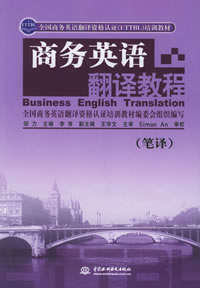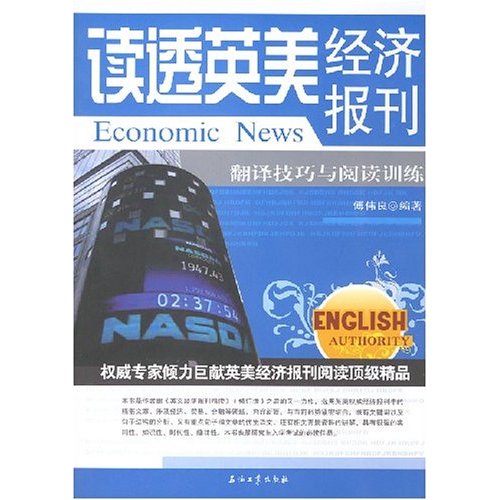Getting Started as a Translator:Gleanings from Honyaku (第三部分)
作者:古龙 2009-07-04




语际翻译公司 转载请注明https://www.scientrans.com
∗本栏目部分文章内容来自互联网,部分已经过本站编辑和整理,如有版权事宜请联系Email/MSN jesczhao@hotmail.com
Konrad Godleske
________________________________________
To get started, you might enjoy translating something that you've read and enjoyed, regardless of the field it's in. My first (unpaid) translation was a short story that I liked and wanted my non-Japanese-reading parents to read. Learning to translate with good quality partly depends on the quantity of translation work you've already done (because the work, whether or not its paid, gives you opportunity to meet first hand, and experience tackling, the various problems involved in translation), so it couldn't hurt to get started.
David Shinozuka
________________________________________
A method that I adopted years ago during the intense language-acquisition phase was to make up my mind before starting to read whether or not I would be reading simply for general comprehension or as a grammar-skills and vocabulary building exercise. That resolved up front the occasionally agonizing dilemma of whether to interrupt the reading process to make sure I could account for everything that was happening in the text, or to keep on trucking, mindful that we all have acquired much of our understanding of our native languages through intensive, long-term exposure, not necessarily via grammar books.
Tom Coffey
________________________________________
From July 1994:
________________________________________
I can attest from my personal experience that you do not need to have some sort of advanced degree to be a professional translator. Most of the time, my clients couldn't care a whit that I never even finished a BA or BS degree. I guess that makes me kousotsu in the vernacular. I support myself quite nicely as a full-time technical translator. Of course, I already have 8 years experience in the business and clients care much more about experience than anything else.
I started out translating in-house at a Tokyo sci-tech magazine publisher. They were quite lenient about deadlines (it was only a quarterly) and the editors would point out my mistakes quite carefully.
Even though I did not have a degree, I had studied university physics for two years and was quite interested in the physical sciences in general, having read many science magazines religiously (Scientific American, etc.).
If you have a particular field that you are interested in, you might try making that your "specialty" by getting and reading as many dictionaries and English publications you can on that specific field. If you can demonstrate a reasonable familiarity with the terminology for one specific field, airlines, for example, then you can tell the translation agencies that this is your specialty. Then, when they come across something in that field and their regular translators are hiking the Himalayas, your name will stick out and they will call you.
The problem with going the freelance route is that you pretty much have to call and fax and bother and pester the agencies for at least six months before you will get any reasonable response at all. Once they are used to hearing your name, they will call you, but that first six months of no income can be a killer.
Alan Siegrist
________________________________________
From March 2001:
________________________________________
As a generalist, I don't think it is necessary to specialize, except in learning Japanese and learning to translate. Another thing: degrees aren't worth much. Get past it. However you can get a foot in the door, go for it. Answer a call for translators that gets posted on Honyaku, for example, do a few trial translations... You need the tools, the intellectual capacity and the motivation/work ethic, but it won't work to fool anyone about your level of Japanese. Be honest about where you are, get taken under someone's wing, and study up while on the job for the first two to three years. (Actually it's an ongoing learning process. :-)
Translation is the school of hard knocks. You learn from doing. There is no single "getting the job." Jobs (hopefully) come one after another. Building good working relationships is the goal. You like to work with someone; they like to work with you and like your work. The pay is acceptable. It may take time at first, but you get faster and better with experience. Then your skills are worth more, you can ask for more, you can handle more. When you can work twice as fast, the same page rate starts looking quite good. But you have to start somewhere. That's why some people suggested working in-house. You don't have to start that way. I didn't. But you do have to start somewhere. (Yes, get thee to the Land of the Rising Sun...)
- 评论
- seme:文章内容文章内容文章内容文章内容文章内容文章内容文章内容文章内容文章内容 章内容文章内容文章内容文章内容文章内容
- seme:文章内容文章内容文章内容文章内容文章内容文章内容文章内容文章内容文章内容 章内容文章内容文章内容文章内容文章内容

- 谈翻译观念的嬗变与翻译技能的训练
2009-6-15 15:33:10 - 《高等学校英语专业英语教学大纲》中规定,大学生通过四年的在校学习,“能运用翻译的理论和技巧,将英美报刊上的文章以及文学原著译成汉语,或将我国报刊、杂志上的文章和一般文学作品译成英语……。译文要求忠实...
- 翻译与网络营销
2009-6-11 0:02:31 - Translation and Your International E-Commerce Strategy Most businesses realize that they ...
期刊征稿
- 第四届IEEE生物信息与生…
2009-6-30 19:42:01 - 基本信息 主办单位: 四川大学,IEEE生物医学工程协会(EMBS) 承办单位 开始日期 2010/06/18 结束日期 截稿日期 2009/1...
- 第九届全国光电技术学术…
2009-6-30 19:35:58 - 基本信息主办单位: 中国宇航学会光电技术专业委员会承办单位 开始日期 2009/11/01结束日期 截稿日期 2009...
















